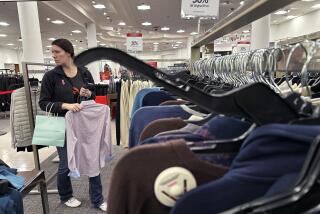Japan’s Leading Indicators Index Falls in June : Asia: Government says the figures mean the economy is still stalled, not in contraction.
- Share via
TOKYO — Japan’s economy received another disappointing diagnosis Tuesday, with the country’s index of leading economic indicators dropping sharply in June.
The index, closely watched as a barometer of trends in economic activity for the subsequent six months, fell to 9.1 in June on a scale of 100, down from 16.7 in May.
It was the second month in a row that the index, which is compiled from a basket of economic indicators such as job figures and money supply, has been below the “boom or bust mark” of 50. A figure of less than 50 generally suggests the economy could recede in coming months.
The data underlines government admissions that the economy had come to a standstill after struggling to make a clear recovery from recession. But the government was quick to deny that the figures indicate the economy is actually worsening.
A senior official from the Economic Planning Agency, which released the data, rejected any notion that the figures show that the economy is contracting.
“The June data do not warrant a change in the government’s assessment that the nation’s economy is stalling,” the official said. “It is too early to change the official economic view by just looking at the figures for the two months” of May and June.
A separate report from Japan’s central bank, also issued Tuesday, echoes the government view that the economy is treading water.
The Bank of Japan’s monthly report says the recovery remains at a standstill, although it notes bright spots such as rising capital investment.
In July, Japan’s government first admitted that the nation’s slow economic recovery had stalled. Until then, it had asserted that the economy was still recovering, albeit moderately, from the recession that followed the bursting of Japan’s 1980s economic “bubble” of inflated land and stock prices.
Analysts said the June figures fell because of poor industrial production, weak housing starts and the lingering negative psychological impact of the Tokyo nerve gas attacks in March.
They were divided, however, on whether Japan’s recent poor economic performance was just a temporary deviation from a general recovery trend.
“I think it’s going to turn out to be a hiccup,” said Jason James, a strategist at James Capel Pacific in Tokyo.
He said that the bad effects of special factors such as the Kobe earthquake in January and the gas attacks should peter out in the second half of the year. He added that progress made in correcting inventory buildups should help industrial production pick up later in the year.
But Masaru Takagi, chief economist at Fuji Research Institute, was slightly more pessimistic.
He said that although the yen’s recent fall against the dollar had boosted hopes of recovery, Japan must take economic measures to ensure that the weaker yen is maintained. A weaker yen makes Japanese exports, the mainstay of the economy, cheaper for overseas buyers.
More to Read
Sign up for Essential California
The most important California stories and recommendations in your inbox every morning.
You may occasionally receive promotional content from the Los Angeles Times.













